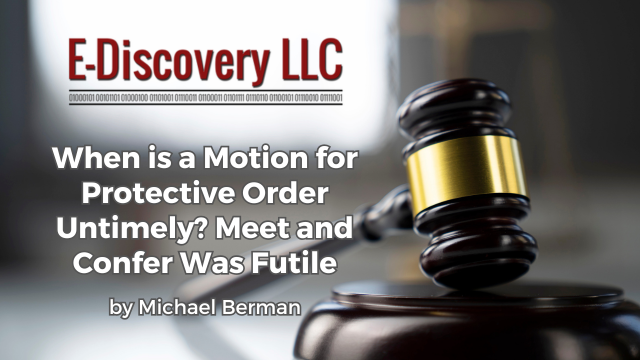
[EDRM Editor’s Note: The opinions and positions are those of Michael Berman.]
Singleton v. Mazhari, 2025 WL 2736530 (D. Md. Sep. 29, 2025)(Austin, J.), covers a lot of ground.
This blog addresses only two of the covered issues: (1) when is a motion for protective order untimely; and, (2) when is the requirement to meet and confer before filing such a motion waived as futile?
Plaintiff Angela Singleton sued supervisors employed by a State agency, TEDCO, alleging discrimination. She issued subpoenas to two non-parties that provided human resources and information technology services to TEDCO. TEDCO moved for a protective order, asserting privilege and confidentiality (issues that were resolved, but not discussed here).
Ms. Singelton alleged that TEDCO’s motion for protective order was untimely. The Singelton Court enunciated the governing standard:
While Rule 26 does not establish a time limit within which a party may move for a protective order, such motion must be “seasonable,” meaning “made prior to the date set for producing the discovery.”
Id. at *3 (emphasis added; cleaned up).
Further, lateness may be excused for “good cause.” Id. at *3.
Ms. Singleton asserted untimeliness because TEDCO acted one month after learning of the key facts and “several years after the beginning of the litigation.” Id. at *4. “She maintains that TEDCO missed its window….” Id. at *3.
The Singleton Court swept aside the argument based on commencement of the lawsuit, writing that: “She cites no authority setting deadlines for protective order requests based on the filing of a lawsuit.” Id. at *4.
And, it held that the former argument was not supported:
The Court is not persuaded that TEDCO’s actions are untimely based on the fact that on September 13, 2024, it learned of Impact HR’s response…. If anything, Singleton’s exhibits suggest TEDCO acted in a timely manner—the email exchange between relevant counsel began on that date Singleton cites that TEDCO became aware of the disclosure and continued for two weeks….) That exchange ended with an agreement on a briefing schedule on this issue, and a motion proposing that schedule was filed the same day…. The parties then adhered to the briefing schedule…. TEDCO’s motion is timely.
Id. at *4 (emphasis added).
In short, when you agree to a briefing schedule, it is an uphill road to argue that a party adhering to the agreement is untimely.
In short, when you agree to a briefing schedule, it is an uphill road to argue that a party adhering to the agreement is untimely.
Michael Berman, E-Discovery LLC.
When rules are silent, common-law often fills the gap. While Singleton addressed the timing for filing motions to compel, there is a substantial parallel body of case law addressing sanctions motions, where the Rules are similarly silent: The “Best Time” to File a Spoliation Motion (Jul. 15, 2025); Another Spoliation Motion Denied as Untimely (Mar. 14, 2024); Spoliation Motions Denied as Untimely – Another Wake-Up Call (Sep. 8, 2023); When Should a Spoliation Motion Be Filed and Decided? (Dec. 26, 2020)(discussing among others, Goodman v. Praxair).
Next, Ms. Singleton, having refused to meet and confer, asserted that TEDCO’s failure to meet and confer barred TEDCO’s motion. The Court found her argument perplexing.
Both the Federal and Local Rules require a certificate of good faith efforts to resolve a dispute before moving for a protective order. Id. at *9. The Court wrote: “[T]he Disputants exchanged 18 emails outlining their positions during the course of about two weeks.” Id. at *2. The Court added:
TEDCO sought to meet and confer on the issues; plaintiff’s counsel demanded that TEDCO withdraw its claims or submit a briefing schedule to the Court…. TEDCO again sought a meet and confer about a protective order…. Plaintiff’s counsel again refused, stating they had no desire to “enter protracted negotiations on a broad protective order” that counsel did not expect would end in an agreement…. Unable to resolve their substantive differences, but agreeing on a schedule for formal briefing, the parties briefed the matter for the Court to resolve.
Id. at *2.
The Singleton Court wrote:
The Court rejects Singleton’s argument that TEDCO failed to meet and confer before filing the Motion. As reflected in Singleton’s exhibit, the parties exchanged several emails regarding TEDCO’s request (and Singleton’s counterproposal) to no avail. More to the point, Plaintiff’s counsel thrice rejected TEDCO’s request to meet and confer regarding a protective order. This conduct made clear that any additional attempts to resolve through the required meet and confer process would have been ineffectual in even having the conversation, let alone resolving the issue….
Id. at *9.
The Court understandably concluded: “The Court is perplexed that Singleton now advances this argument.” Id.
Assisted by GAI and LLM Technologies per EDRM GAI and LLM Policy.


